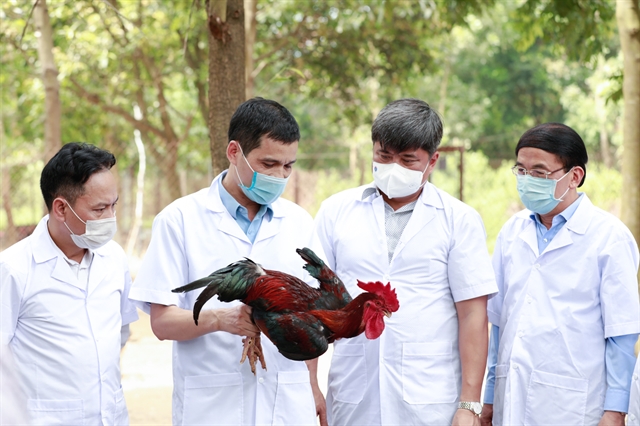 Society
Society

 |
| Deputy Minister of Agriculture and Rural Development Trần Thanh Nam and Deputy Director of Hà Nội Department of Agriculture and Rural Development Nguyễn Ngọc Sơn visit a mía chicken breeding farm in the city. Photo courtesy of the department |
HÀ NỘI — Boosting many agricultural products with high economic value, Hà Nội’s agriculture sector has coordinated with localities to support farmers, cooperatives and businesses to meet local consumption and export demand.
One of the speciality products of the capital city is mía chicken which was included in the list of precious livestock genetic resources by the Ministry of Agriculture and Rural Development in 2005.
Hà Nội Agricultural Development and Investment Company is currently the largest facility in the northern region for farming mía chicken, with 10,000 purebred chickens.
According to the Director of the company’s Poultry Farming Enterprise, Nguyễn Duy Vụ, the chickens are raised on a farm covering 11 ha in Ba Vì District, Hà Nội.
The company provides the market with about 2 million breed chickens a year with advanced equipment and technology.
Longan is another agricultural produce that farmers in Đại Thành Commune in Quốc Oai District are proud of.
Nguyễn Văn Thành, a farmer, has 120 longan trees that produce 30-35 tonnes a year with revenues of hundreds of million dong.
Hà Nội’s agricultural sector has cooperated with localities to build and develop brands for their speciality products.
Deputy Director of the city’s Department of Agriculture and Rural Development Tạ Văn Tường said that the capital city had promoted brands for 40 key agricultural products.
The city authorities have also promoted the One Commune One Product (OCOP) Programme, which prioritises the development of products in which Hà Nội has strength.
Tường said: “Some agricultural products of Hà Nội are of high quality, which are not only strongly consumed in the domestic market but are also exported to other countries. Đại Thành longan (in Quốc Oai District) has been exported to the US, Australia, and Malaysia; Đồng Phú organic rice has been exported to Germany; Văn Đức vegetables have been exported to South Korea, tiêu hồng banana has been exported to China.
Despite the promising potential, many challenges in promoting agricultural produce remain. Many products are produced at a small, fragmented scale that lacks connectivity.
Some households have not paid attention to traceability, making it difficult for businesses to purchase products.
To make the products more accessible, local households need to pay more attention to product quality, packaging design, and application of science and technology.
According to Lê Hữu Diện, Director of Đức Hậu Lưu Quang Clean Agricultural Cooperative (Trung Hòa Commune, Chương Mỹ District), his cooperative is producing and expanding the growing area of Diễn pomelo.
He suggested the authorities support cooperatives with capital and application of high technology in processing and harvesting products.
He said it was also important to open training courses to improve farming skills for farmers, help connect cooperatives with businesses, and bring local products to modern distribution channels.
Vice Chairman of Ứng Hòa District People's Committee Ngô Tiến Hoàng said that the district encouraged local farmers and cooperatives to improve quality and diversify their products.
The district also supported cooperatives to invest in modern machinery and equipment for the production, preservation and processing of products, develop design trademarks, and improve product packaging for some agricultural products.
Deputy Director of Hà Nội’s Department of Agriculture and Rural Development Tạ Văn Tường said that the city would continue to have support to improve product quality and production capacity and expand the market.
In addition, the city’s agricultural sector cooperated with localities to build raw material areas based on the competitive advantages of selected key agricultural products.
He highlighted the importance of developing a standard procedure to ensure food safety and hygiene for different steps, from production to pest prevention, transportation, processing and preservation.
The Agricultural, Forestry and Fisheries Quality Management Division would coordinate with localities to organise training for individuals and businesses on regulations to ensure food quality and safety, as well as control over food import and export, said Nguyễn Thị Thu Hằng, Director of the Division.
It would also strengthen communication work on trade agreements, including FTAs, EVFTA, and CPTPP, and support agricultural product processing facilities to apply the international quality certification system, including ISO, and HACCP. — VNS




